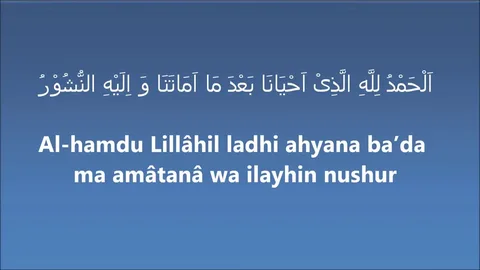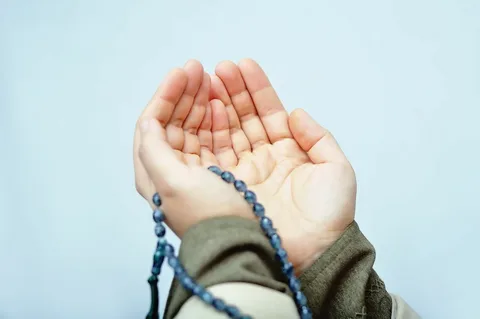Duas After waking up, In the hustle and bustle of modern life, establishing a morning routine can be a powerful tool for setting a positive tone for the day. One practice that holds significant value, especially in Islam, is the act of reciting a dua when waking up. in This article Arabian Tongue website delves into the spiritual and psychological benefits of this practice, exploring its impact on daily life and well-being.
Understanding the Concept of Dua
Dua, in its essence, is a form of supplication or prayer. It involves reaching out to a higher power, expressing one’s needs, desires, and gratitude. In Islam, dua is considered a direct channel of communication with Allah, fostering a sense of connection and reliance on divine guidance.
Recommend: Ramadan Dua List
Duas After waking up

Incorporating Dua into Your Morning Routine
To fully embrace the benefits of morning dua, it’s essential to create a conducive environment. Establishing a dedicated space for reflection and prayer helps in cultivating a sense of sacredness. Consistency is key, making the dua a habitual and integral part of the morning routine.
Morning Affirmations vs. Dua
While morning affirmations have gained popularity for promoting positivity, dua offers a unique blend of spiritual connection and affirmation. While affirmations focus on self-empowerment, dua goes beyond the self, acknowledging a higher power and seeking divine assistance.
Read more: What is Sunnah in Islam
Scientific Perspectives on Morning Rituals
Scientifically, the impact of morning rituals, including dua, extends to hormonal levels. The act of supplication has been associated with reduced cortisol levels, contributing to a more relaxed and focused state of mind. This aligns with the spiritual benefits, highlighting the interconnectedness of mind and spirit.
Dua and Gratitude
The connection between dua and gratitude is profound. By starting the day with a supplication that acknowledges the blessings and seeks protection, individuals cultivate a mindset of gratitude. This, in turn, shapes their outlook, fostering resilience in the face of challenges.
Dua for a Productive Day
Beyond spiritual connection, the morning dua serves as a guide for navigating the day ahead. Seeking guidance for daily tasks and endeavors, individuals set the stage for a more purposeful and productive day.
Cultural Variations in Morning Prayers
While the practice of morning prayers varies across cultures, the underlying theme of seeking guidance and protection is universal. Exploring these cultural variations highlights the diversity in approaches to spiritual rituals while emphasizing shared values.
Teaching Children the Importance of Morning Dua
Instilling the practice of morning dua in children not only imparts cultural and religious values but also establishes a foundation for mindfulness and gratitude. Making dua a family tradition creates a bond centered around shared spiritual practices.
Adapting Dua to Modern Lifestyles
In a world driven by technology and constant activity, finding moments of reflection can be challenging. Adapting the practice of dua to modern lifestyles involves integrating technology for reminders and carving out brief moments for spiritual connection amidst a busy schedule.
Learn Now: learn Online Quran Memorization Course
FAQs
Is dua only for Muslims?
Dua is a universal practice, but its specific rituals may vary across religions.
How long should I spend on morning dua?
The duration is subjective; the emphasis is on sincerity and focus.
Can morning dua replace other morning rituals?
It can complement other rituals, but each serves a unique purpose.
What if I forget to recite the morning dua one day?
Consistency is encouraged, but occasional lapses are understandable.
Can I recite dua in languages other than Arabic?
While Arabic is preferred, sincere supplication in any language is accepted.
Conclusion
In conclusion, the morning dua offers a holistic approach to starting the day. Its spiritual, psychological, and practical benefits make it a valuable practice for individuals seeking a balanced and purposeful life. Embracing the morning dua as a daily ritual can foster a sense of connection, gratitude, and resilience.



